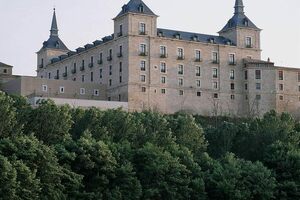Ducal Palace of Lerma in Lerma, Spain

This 17th century palace was the home of Francisco Gómez de Sandoval y Rojas, Duke of Lerma and an influential favorite of Spain’s King Phillip III. The duke was an important diplomat who negotiated numerous treaties and his magnificent and imposing palace was meant to serve as a symbol of his power. He was also something of a religious and racial bigot and was the person who, along with the Archbishop of Valencia, Juan de Ribera, initiated the expulsion of many thousands of Moriscos, descendants of Spain’s Muslim population who had converted to Christianity. These two zealots also encouraged the king to enslave the Moriscos to use as laborers, which they claimed he could do “without any scruples of conscience.” Thankfully, the proposal was rejected.
The duke eventually fell from grace (but not before becoming a cardinal) and his palace fell into disrepair. Today, it has been restored and turned into a parador, a state-run high-end hotel. The palace is one of many historic buildings used in this Spanish effort to support tourism.
As you approach Lerma, the four imposing black spires at the corners of the building are visible from a great distance, looking like a giant, slightly menacing ecclesiastical edifice. In keeping with the ideas that originated there, the building looks like one might imagine the headquarters of the Spanish Inquisition. But when viewed up close from the town square, it looks imposing and palatial. The palace had magnificent gardens and was reputed to have had seven chapels, though only one remains.
Next to the palace is an impressive church which, like the palace, bears the Duke of Lerma’s coat of arms. Also check out the other historic buildings in the town including the tourist office, in a building where Rubens is said to have stayed.





